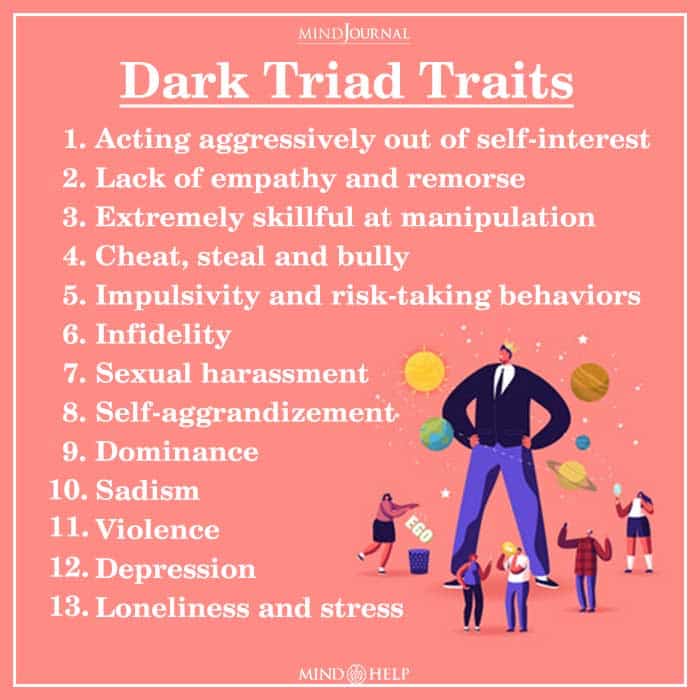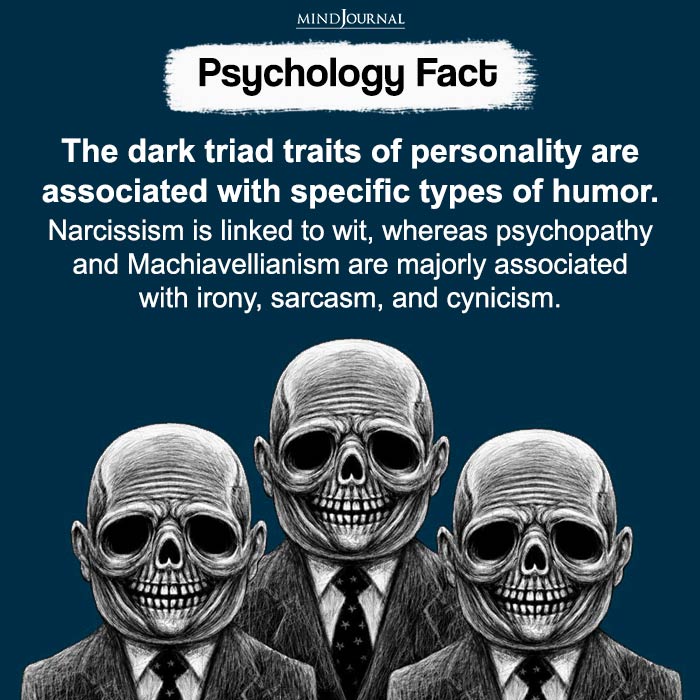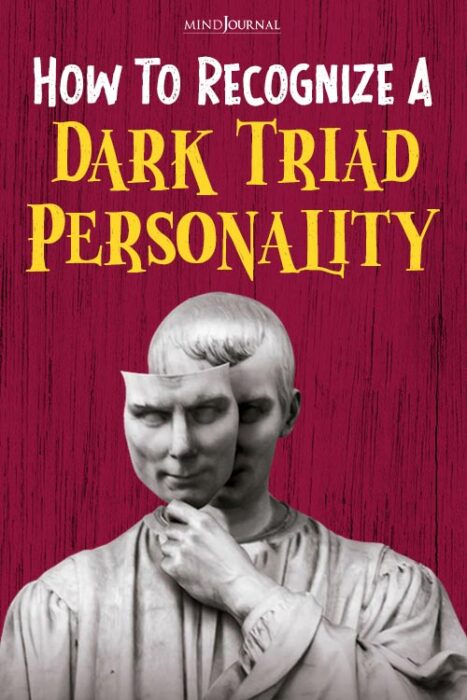“Decoding the Dark Triad: Understanding the Differences and Detecting the Traits of Narcissism, Machiavellianism, and Psychopathy”
Have you ever heard of the dark triad personality? Dark triad personalities have a hard time holding onto healthy relationships and tend to exploit others for their own selfish needs. Read on to know more about who they are and how they function.
Key Points
- The three Dark Triad personality subtypes are narcissistic, Machiavellian, and psychopathic.
- People possessing Dark Triad personalities tend to have unstable relationships and take advantage of others.
- One who becomes involved with someone with a Dark Triad personality should find support from others to shore up and defend their sense of self.
In 2002, psychologists Delroy Paulhus and Kevin M. Williams identified a trio of personality types that are commonly recognized as pathological, but do not meet strict criteria for personality disorder or for Axis I pathology.
Because this set of personality types includes psychopathy, Machiavellianism, and narcissism, it has become known as the Dark Triad.
People with any of these distinct and unpleasant traits may not meet the criteria for narcissistic personality disorder or anti-social personality disorder, but that doesn’t mean they can’t do any harm. Here’s how to identify people like this, and what to do if you encounter them.
Related: The Dark Triad: How To Protect Yourself From The 3 Most Dangerous Personalities
If you’ve never met someone with a Dark Triad personality, consider yourself lucky: These traits are reasonably common in our culture, according to Thomas Plante, professor of psychology at Santa Clara University.
In fact, contemporary American society may even reward or reinforce the self-serving behavior that the Dark Triad engenders.
Dark Triad types’ lack of empathy and tendency to manipulate others usually causes their relationships to be one-sided and difficult: Research on the Dark Triad has associated the traits with significant problems in relationships, and with a wide range of unpleasant interpersonal behavior.
This means aggression, violence, coercion, or manipulation in the workplace (Kaufman et al, 2019) or hedonism, one-night stands, and “using” people for sex (Jonason et al., 2008; Lee et al., 2013; Kajonius et al., 2015; Jonason and Ferrell, 2016; Balakrishna et al., 2017).
It might best sum up the Dark Triad personality to say that it has even been associated with the Seven Deadly Sins (Veselka et al., 2014; Jonason et al., 2017, as reported in Kaufman et al., 2019).

How Dark Triad Personalities Differ
To be more specific about Dark Triad personality expression, one must distinguish its three separate types from each other.
First, narcissists — in the popular sense — correspond exactly to what you’d expect: They’re vain, grandiose, entitled, and possess an unearned sense of superiority. By contrast, Machiavellians are predominantly manipulative and deceptive, and often seek self-gratification at the expense of others.
Worst of all, psychopathic personality types — sometimes called sociopathic or antisocial — are characterized by callous, remorseless impulsivity and a near-total lack of empathy.
All three of these personalities, according to Darlene Lancer on Psychology Today, tend to “act aggressively out of self-interest,” and will “violate social norms and moral values” by lying, cheating, stealing, and bullying their way to get what they want.
Related: What Is Dark Psychology: 10 Most Common Techniques and Tactics of Manipulation
The three Dark Triad subtypes also differ in ways that psychological research has isolated.
According to Paulhus and Williams (2002), the only Big Five personality factor common among all three subtypes was a lack of agreeableness — a distinct “disagreeableness,” one might politely say.
Subclinical psychopaths stand out from the other two types by being the least neurotic — that is, least prone to feelings of worry or guilt.
This makes a certain amount of sense, in that the brains of sociopaths have been found to show fewer connections between the neurological regions from which anxiety is derived (according to researchers at the University of Wisconsin at Madison).
Psychopaths, as well as Machiavellians, displayed low conscientiousness (that is, they do not appear to feel any desire to “do the right thing”), and narcissists generally showed the expected tendency toward self-enhancement.

What To Do If You’re In A Relationship With A Dark Triad Personality
So, what should you do if you find yourself in a relationship with a Dark Triad personality? Get away, according to psychotherapist and author Paul Hokemeyer, Ph.D.
You may initially believe you are making the acquaintance of a charismatic, glamorous new friend, but people with Dark Triad personalities can’t sustain this positive charade for long (according to Hokemeyer).
You may notice that your new acquaintance often talks about being victimized by others; you might also notice alarming inconsistencies in the stories they tell. Or you may start to feel as though you serve their chronic need for validation.
Related: 10 Surefire Signs You’re Dealing With A Psychopath
If and when you end up getting close to someone like this, be sure to maintain alternative sources of support in your life (such as other close friends, family members, or a trusted therapist). Don’t allow yourself to be isolated.
Ultimately, as Hokemeyer says, people with Dark Triad personalities are not likely to change much as they age, so you may have to bring an unambiguous end to the relationship.
If you need to discontinue a relationship like this, seek support from people who do not manipulate or control you so that you can preserve and defend your sense of self.
Want to know more about dark triad personality traits? Check this video out below!
Check out Loren Soeiro’s blog for more such informative, educative, and interesting articles.
References:
Booth, S. (2021, June 23). What Is the Dark Triad, and Why Are People With These Personality Traits So Dangerous? Here's What Experts Say. Retrieved from https://www.health.com/condition/antisocial-personality-disorder/dark-t… Jonason, P. K, Luevano, V. X. & Adams, H. M. (2012) How the Dark Triad traits predict relationship choices. Personality and Individual Differences, 53(3), Pages 180-184. Kaufman, S. B, Yaden, D. B. Hyde, E., Tsukayama, E. (2019). The Light vs. Dark Triad of Personality: Contrasting Two Very Different Profiles of Human Nature. Front. Psychol, 10, 467. Lancer, D. (2018, December 10). Beware of the malevolent dark triad. Retrieved from https://www.psychologytoday.com/us/blog/toxic-relationships/201812/bewa… Paulhus, D. L. & Williams, K. M. (2002). The Dark Triad of personality: Narcissism, Machiavellianism, and psychopathy. Journal of Research in Personality 36(6), pp 556-563. Sachdev, G. (2021, June 19). Does your partner have dark personality traits? Here’s how you can tell. Retrieved from https://www.healthshots.com/mind/emotional-health/does-your-partner-hav… University of Wisconsin-Madison School of Medicine and Public Health. (2017, November 7). Psychopaths’ brains show differences in structure and function. Retrieved from https://www.med.wisc.edu/news-and-events/2011/november/psychopaths-brai…
Written By Loren Soeiro Originally Appeared On Psychology Today









Leave a Reply
You must be logged in to post a comment.